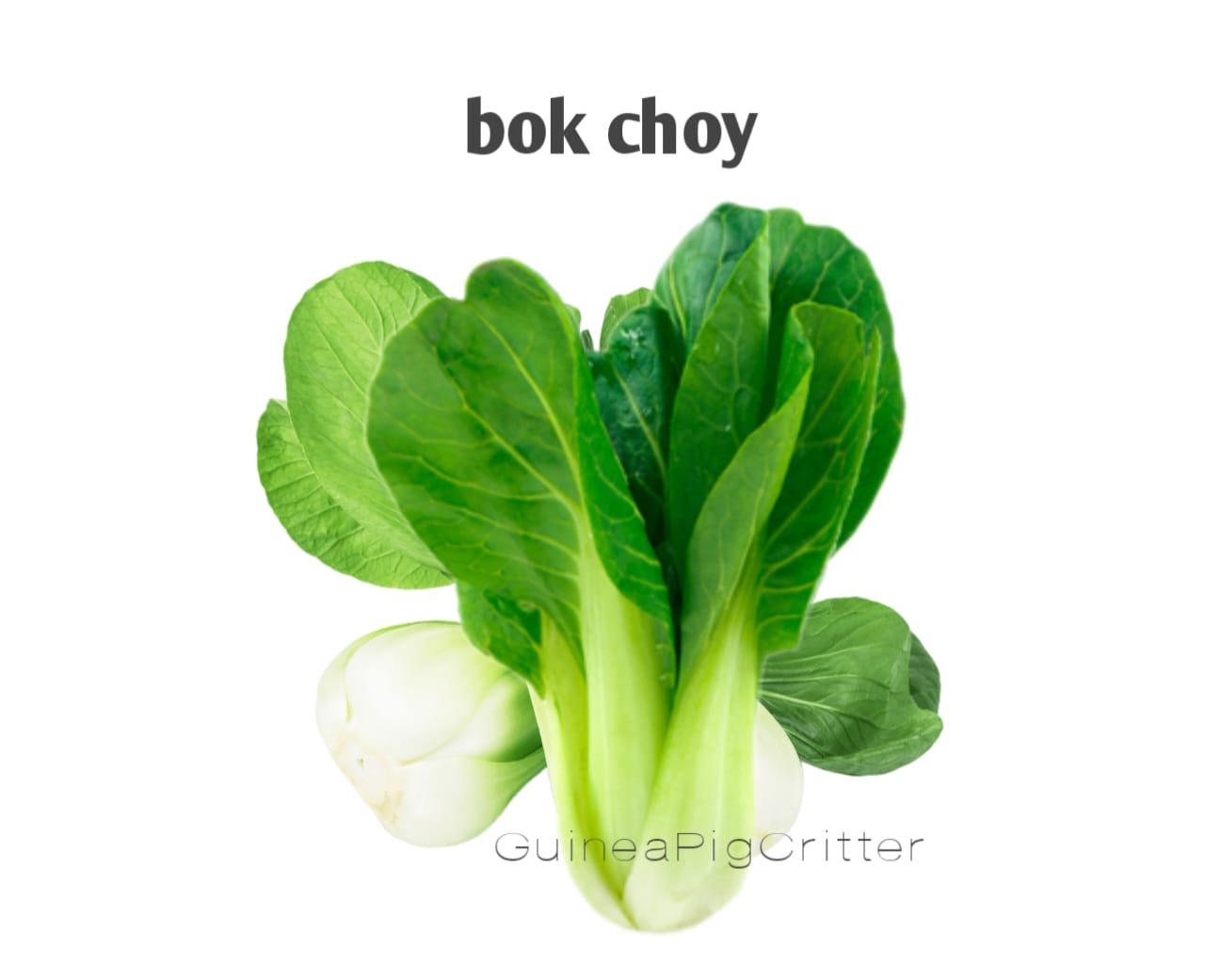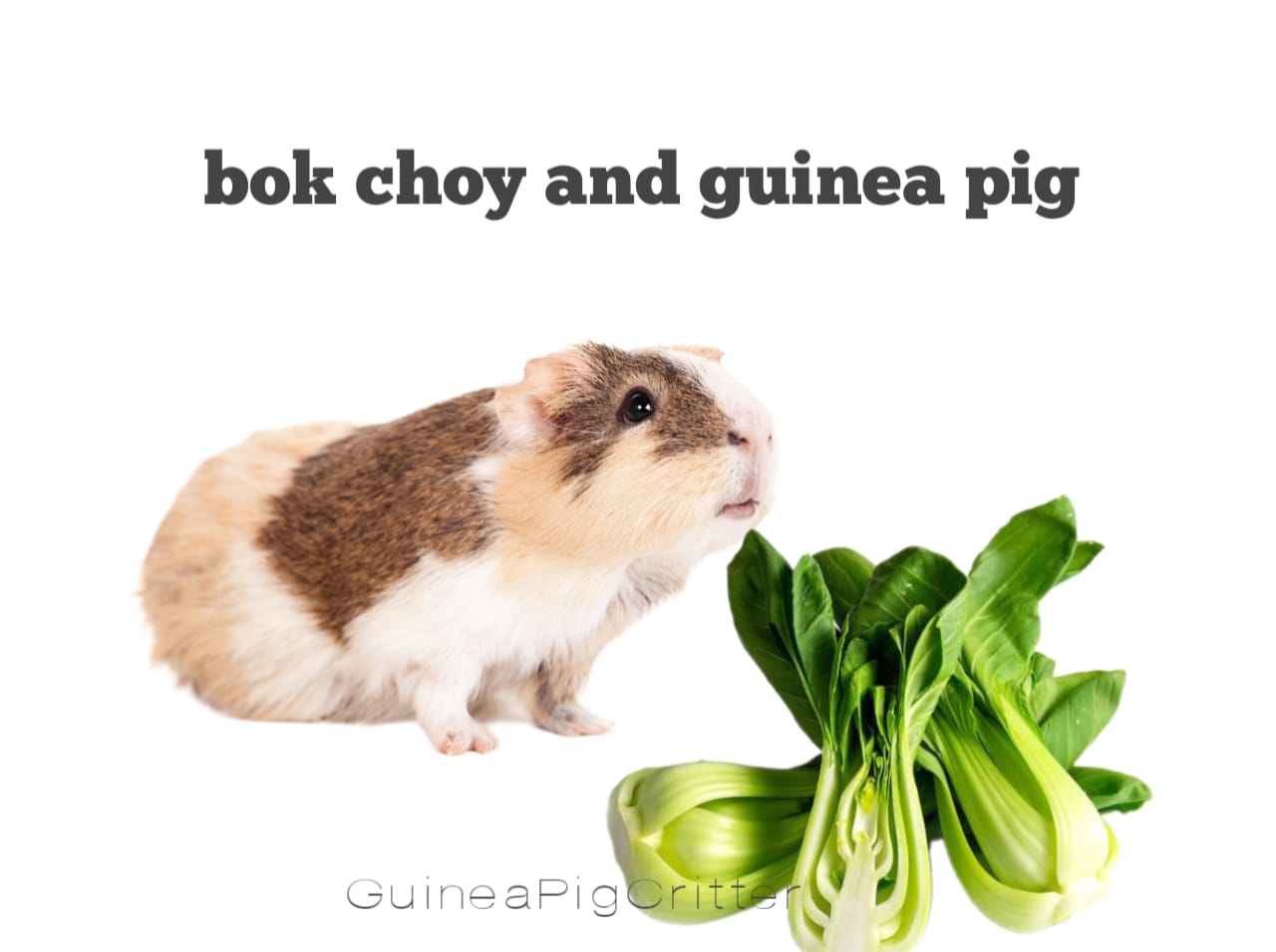Dietary requirements are of utmost importance when it comes to the question of giving food to our dear guinea pigs. We should know which foods are safe and healthy for them as pet parents. One often wonders whether guinea pigs can eat bok choy? This post will thoroughly analyze this issue, offering an all-round answer on whether or not you should include bok choy in your pet’s diet.
Today’s question is :-can guinea pigs eat bok choy?
Bok choy is one such plant that might interest guinea pig owners. Bok Choy, also known as Chinese cabbage, is a leafy green vegetable commonly used in several Asian dishes. So does it make sense to feed your cavy with bok choy? Let’s delve into this further.
Guinea pigs easily become valued family members because of their cute sounds and pleasant characters. Their diet as grass-eaters largely comprises hay, fresh produce and a small measure of fruit. But when it comes to guinea pig nutrition, not all vegetables work the same way. Whereas some are safe and beneficial, others could be dangerous if fed improperly.
See this post:-Can guinea pigs eat pears?
What does the term bok choy mean?
Before we conclude whether or not bok choy is safe for guinea pigs, it’s crucial to understand what this vegetable is and what it contains.
The scientific name for Bok Choy is Brassica Rapa subsp. chinensis, and it represents a cabbage form from China. Unlike traditional cabbages with green leaves, Bok Choi has dark-green leaves and crisp white stalks. It is popular for being mild tasting as well as having high nutritional content hence used in many recipes.
Nutritionally speaking, bok choy is filled with various vitamins and minerals such as;
- Vitamin C which is an important anti-oxidant that helps in maintaining the immune system
- Vitamin K which plays an important role in blood clotting and maintaining healthy bones
- Vitamin A that supports healthy vision and immune function
- Calcium helps in building strong bones and teeth
- Potassium that controls fluid balance within the body as well as muscle contractions and nerve signals.
From these nutrients alone, it would appear that bok choy may be a healthy choice; however we need to examine how it affects guinea pigs specifically.
Can Guinea Pigs Eat Bok Choy?
The concise answer is yes, guinea pigs can eat bok choy but with some major caveats. Guinea pigs can have this vegetable without any issues provided they eat moderate amounts of it while observing a balanced diet. Here’s why:
Great in Vitamin C:
One of the main advantages of the vitamin C bok choy is that it has very high levels. Guinea pigs, like humans, are unable to synthesize vitamin C, so they have to rely on the diet. However, if there is a failure in supplying this vitamin deficiency, guinea pigs will be subjected to scurvy which is a severe health problem among them. Therefore giving them bok choy as part of their meals will help meet these daily requirements for vitamin C.
No sweet:
Bok Choy has less sugar content compared to many other types of vegetables hence making it healthier for guinea pigs as this can prevent obesity and diabetes when fed with excessive sugars.
Fiber content
Fiber is an important component in guinea pig’s diet because it helps digestion and prevents gastrointestinal problems. Bok choy leafy greens offer a good fiber source.
Bok choy has its benefits some risks come hand in hand with it.
Dangers and Guidelines:
Despite its nutritional value, bok choy should be treated with care while feeding the animals such that one should consider these dangers:
High Calcium Content:
However, over-calcification of guinea pigs may result in bladder stone development despite the fact that it is necessary for bone strength. It contains a moderate amount of calcium which means you should only give it to them in a small quantity. When adults consume more than enough foods rich in calcium, they can end up with such severe disorders like bladder stones.
Presence of Oxalates:
Bok choy is one plant that contains oxalates naturally inside it. If found in large quantities, they combine with calcium to form another type of stone known as calcium oxalate stones which are also present in bladder stones. Although bok choy has lower levels of oxalates compared to spinach and other vegetables, still this calls for caution.
Gas and Bloating:
Bloating or gas may occur after eating bok choy depending on the individual guinea pig’s system used to it. This is because the vegetable belongs to the family Cruciferae just like broccoli or cabbage and it is hard for some guinea pigs to digest them.
Given all these risks, ensure bok choy is eaten infrequently, if at all by ensuring its inclusion as part of a diversified diet plan.

How to Serve Bok Choy to Guinea Pigs
If you decide this vegetable should be part of your guinea pig’s diet, it is important to do so correctly. Here are some tips on how to safely serve it:
Start Small:
You can give bok choy for the first time to your guinea pig as a small portion in order to assess its response. Look out for any signs of unsettled stomach such as diarrhea or bloating. If your pet does well with bok choy you can gradually increase the serving size.
Wash Thoroughly:
Always ensure that you wash this vegetable properly when cleaning to get rid of any chemicals, dirt or contaminants. While organic bok choy is better, make sure you wash all organic vegetables prior to serving them.
Chop into Small Pieces:
Cut the bok choy into tiny pieces which are manageable. This makes it easy for your guinea pig to eat and reduces chances of choking.
Mix with Other Vegetables:
Mix bok choy with other safe vegetables like bell peppers, cucumbers, and leafy greens like romaine lettuce so that it has a balanced diet throughout its life span in captivity; these variations will not only enrich their nutrients but keep them craving for more food whenever they see it.
Bok Choy should not be fed to guinea pigs for more than 2-3 times a week. It will help prevent an excess intake of calcium and oxalates while enabling them to benefit from this vegetable’s nutrients.
Other vegetables instead of Bok Choy
If you are worried about feeding bok choy and would like your guinea pigs’ meals to have some variety, there are many other vegetables that are safe and healthy for your pets. Some of these include:
Romaine Lettuce:
Romaine lettuce is popular among guinea pig owners due to its low calcium content as well as high fiber which is good for their digestion. Besides, it has water content that help in hydrating them.
Bell Peppers:
Guinea pigs should be given bell peppers which are rich in vitamin C but low in calcium. These varieties come in different colors each having slight nutritional differences.
Cucumber:
Cucumbers can serve as cool treats with less calories for risk free weight loss. Yet they must be offered sparingly because the melon’s high water will trigger diarrhea if overfed.
Cilantro:
Another kind of leafy greens that guinea pigs tend to prefer is cilantro. It is packed with vitamin C and features a unique taste that makes their diet more interesting.
Check also :- Can a guinea pig drink orange juice?
Signs of Overeating or Allergies
Over-feeding and/or allergic reactions are possible, even with safe foods such as bok choy in guinea pigs. Here is how to look for some signs:
Diarrhea:
Soft stools may indicate that the system of your pet guinea pig’s digestive is having trouble getting used to a new food. Should you notice that diarrhea becomes frequent each time after the introduction of bok choy, it means you need to cut its portions or remove it from their diet altogether.
Bloating:
Some guinea pigs might suffer more from cruciferous vegetables like bok choy. In case you realize your guinea pig’s belly looks puffy or he seems uncomfortable, then keep away from giving him bok choy going forward.
Lethargy:
If your pet appears less vibrant after feeding on bok choy, this could be an indication that the food disagrees with them. Watch its behavior closely and when lethargy persists, seek advice from a vet.
Urinary Issues:
As a result of over-feeding on bok choy which has calcium in it, urinary problems like difficulty urinating or presence of blood in the urine can be experienced by guinea pigs. These symptoms may suggest bladder stones and veterinary assistance should be sought immediately.

Questions Frequently Asked
How much bok choy can I give my guinea pig?
In order to feed your guinea pig at least 2-3 times weekly on small quantities of bok choy about the same size as one or two leaves depending on how big your cavy happens to be.
Can baby guinea pigs eat bok choy?
While adult Guinea Pigs can have bok choy once in a while, it is better not to do so for newborns due to their delicate stomachs. Instead you could focus on offering hay and pellets designed specifically for young cavies like timothy hay based ones plus those made from alfalfa meal respectively.
What should I do if my guinea pig doesn’t like bok choy?
If your guinea pig doesn’t enjoy bok choy, don’t worry. There are plenty of other vegetables they can eat. Try offering alternatives like bell peppers, romaine lettuce, or cilantro to see what they prefer.
Can bok choy cause urinary stones in guinea pigs?
Yes, if fed in large quantities, the calcium and oxalates in bok choy can contribute to the formation of bladder stones. This is why it’s crucial to feed bok choy in moderation and balance it with other low-calcium vegetables.
Is bok choy better than other leafy greens for guinea pigs?
Bok choy has its unique nutritional benefits, such as high vitamin C content, but it also carries risks due to its calcium and oxalate content. Other leafy greens like romaine lettuce may be safer for regular feeding.
Conclusion
Finally, it is important to note that when eaten in moderation, bok choy can be a healthy addition to a guinea pig’s diet. Its high levels of vitamin C, low sugar content, and fiber make it ideal for the purpose of nutrition. Nevertheless, one should take caution with regard to the potential risks associated with this such as calcium and oxalate contents, which can result in health problems if consumed excessively.
Like all new foods bok choy must be introduced gradually while watching out for signs of digestive upset in your guinea pigs. To avoid over consuming any single nutrient and provide a balanced diet mix bok choy with other safe vegetables.


